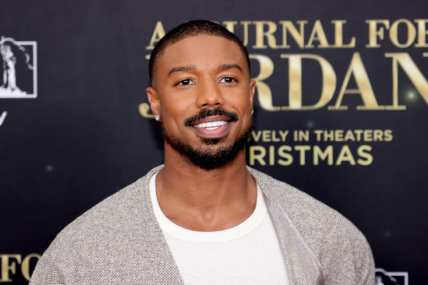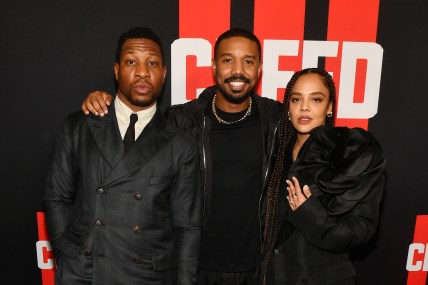‘Creed III’ lets Black men be soft
OPINION: Michael B. Jordan’s directorial debut is a triumph of the restorative power of Black male gentleness, self-control and forgiveness.
Editor’s note: The following article is an op-ed, and the views expressed are the author’s own. Read more opinions on theGrio.
Spoiler Alert: This review contains details for the plot of “Creed III”
In our homophobic, patriarchal culture, among the worst insults for Black men is to call them “soft.” It’s an adjective that calls into question the usefulness of a man’s masculinity if he cannot physically dominate and control, as is expected. In an unlikely twist, the Black boxing blockbuster franchise “Creed” turns that concept on its head.
Ever since Ryan Coogler’s “Creed” premiered in 2015 with a young Michael B. Jordan as Adonis Creed, the “Rocky” spinoff has specifically and intentionally explored what it means to be a Black man. Adonis has grown up institutionalized and fatherless after his famous boxer father, Apollo, died in the ring because he refused to stop fighting a dangerous opponent.
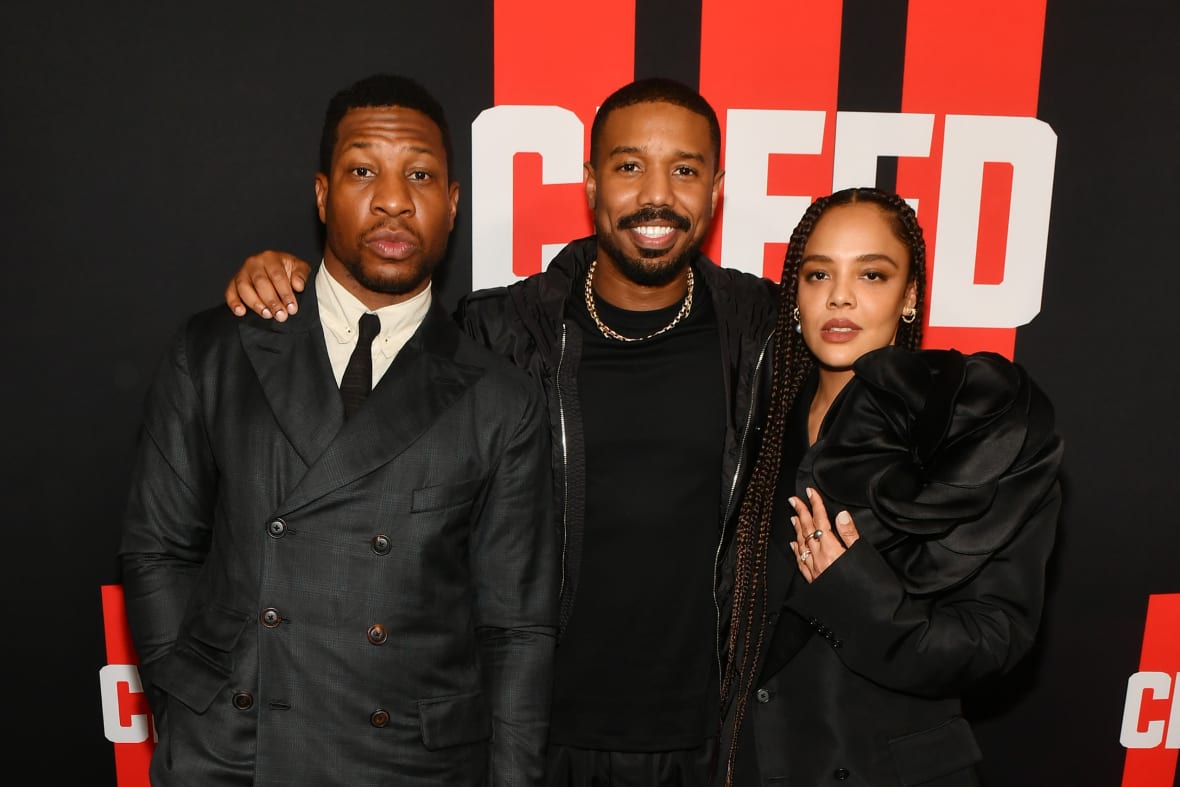
It’s a portrait of Black masculinity that Adonis internalized in “Creed,” fighting the world even to his detriment as his rage and grief over never knowing his father fuel his childhood stints in juvenile detention and his professional boxing career. It’s only when Adonis re-roots his masculinity in community, forgiveness and self-control, rather than the domination of others, that he begins to heal, forgive his father and reconnect with his trainer, Rocky (Sylvester Stallone), his emerging singer girlfriend, Bianca (Tessa Thompson) and his adoptive mother (Phylicia Rashad).
In director Steven Caple Jr.’s “Creed II,” Adonis has grown in size and stature from light-heavyweight to heavyweight champion of the world. At the height of this new physical power and status, he comes face to face with Drago, the son of his father’s killer. Despite Bianca and Rocky warning him that Drago is too dangerous to fight, Adonis once again falls prey to toxic masculinity, chooses his ego and pride over self-control, and nearly meets the same fate as his father. Drago’s punishment in the ring lands Adonis in the hospital. With his relationships and his body fractured, Adonis can only heal and defeat Drago in a rematch after he humbles himself to repair his relationships.
In “Creed III,” Jordan’s directorial debut nearly a decade after the original film, Adonis has fully embraced softness, and that shift empowers the women and girls around him and fuels their portrayal as fully realized characters. It’s the best “Creed” yet, for the franchise and Adonis. He enjoys a loving marriage with Bianca, and they’re co-parenting their young daughter Amara (a fantastic Mila Davis-Kent), who is deaf.
Immediately following his retirement from boxing as the reigning champ, we see Adonis, barefoot, in a dinosaur onesie, pouring tea at his pretty princess daughter’s tea party for two. Adonis celebrates Amara’s love for boxing, and his support appears to set up a future “Creed” film for her.
His parenting affords Bianca space to make more hit records, but this time as a producer rather than a rockstar, to preserve what’s left of her hearing. Though I miss Thompson singing her original songs as she did in the first two films, expounding on the impact of Bianca’s hearing loss gives Thompson the opportunity to flex as her character deals with the grief of losing her dream. It also allows “Creed III” to be the most inclusive and accessible installment yet. Characters use American Sign Language throughout the film, and the Los Angeles premiere included on-screen closed captions (as every theater should!).
But the good times don’t last. Adonis’ childhood best friend, Damian “Dame” Anderson (Jonathan Majors), comes back into his life and threatens his comfort and sense of self. After being incarcerated for 18 years for pulling a gun to protect Adonis, amateur boxer Dame has a serious chip on his shoulder because Adonis abandoned him. He’s returned to get revenge and to take Adonis’ place as world champ.
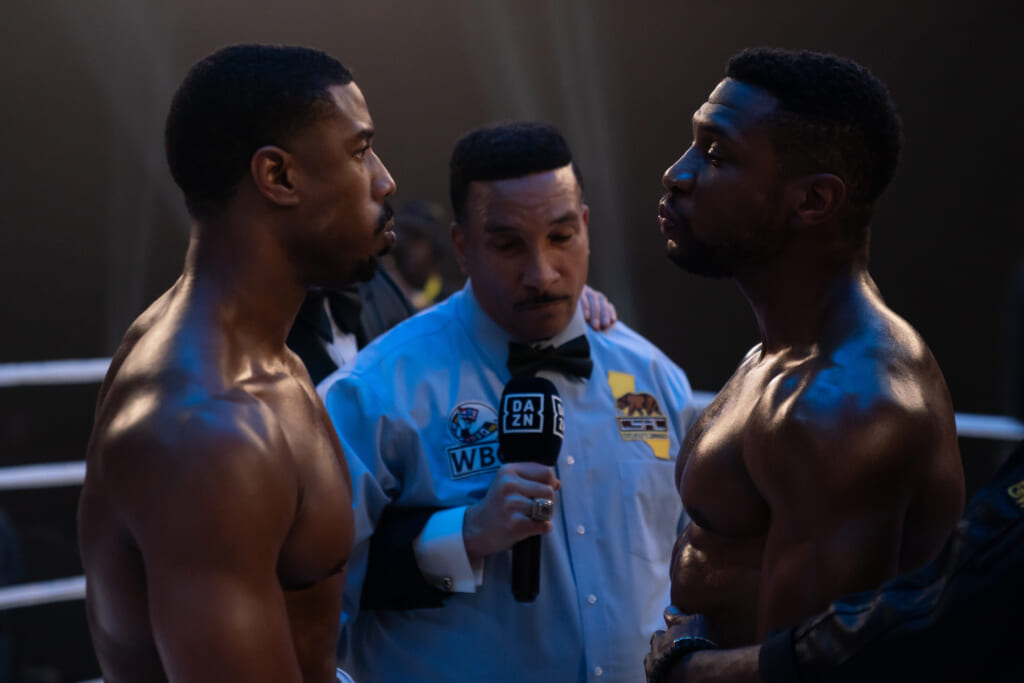
Throughout the franchise, Jordan’s Adonis is quick-tempered, yelling and pounding down doors and punching men who are in his way. It’s a performance within a performance of what the world has taught Adonis that Black masculinity is. But Majors’ Dame has a quiet rage that’s a thousand times more terrifying.
Sure, he’s lost half of his life to the prison system and had to watch behind bars as his best friend abandoned him and lived his dream of becoming the world champ, but he smiles and laughs and jokes – about everything from the bedbugs that used to torment him and Adonis as children in an abusive group home, to the brutal beating he’s given Adonis’ prize fighter. Even as he snickers in Adonis’ face, a gun in his waistband, it’s all a mask for Dame’s deep-seated rage at his former friend’s abandonment. It slips out as a sneak punch to Adonis’ face that spills blood, followed by a sly smile and a, “You alright.” It’s yet another show-stealing performance from Majors that proves how attuned he is to the emotions underneath the emotions that his characters display.
Dame taunts Adonis with the word “soft,” but in reality, it’s all he craves. The world has been hard enough, trapping him in cycles of abandonment, violence and loss. Joseph Shirley’s pitch-perfect score over the scene where we first meet the grown-up Dame tells us that a threat is near, but it’s not Dame that Adonis has to fear. The real danger lies in refusing and being refused softness. A talented and thoughtful director, Jordan shows us as much by introducing us to Dame from behind, in unironically soft focus. We are not meant to judge Dame as a villain, but to see him with compassion, as Majors, Jordan and eventually Adonis do.
What if Adonis had stayed in touch with Dame while he was in prison? What if Adonis hadn’t started the fight in the first place? What if Adonis had apologized immediately upon Dame’s arrival? It’s a level of softness that Adonis cannot access while he’s riddled with guilt and shame over his behavior, and everyone pays the price.
When Dame promises to take everything away from Adonis, he begins with Adonis’ softness. Dame cozies up to Bianca and gives her more space than Adonis ever does to talk through her emotions about losing her performing career as a result of progressive hearing loss. It’s a destabilizing tactic on his part, and it works to remind Bianca where Adonis has hardened to her needs.
But it isn’t only Bianca. Adonis has shut everyone out since Dame’s return, and he even scares his daughter by yelling at his wife for trying to get him to open up. He also yells at his stroke-survivor mother, blaming her for the rift between him and Dame. He refuses comfort from his loved ones because he’s drowning in shame and old doubts about his worthiness of the soft life he leads at Dame’s expense. Adonis has lost control of himself again, to devastating effect.
Though I’m past tired of the Cooglers killing off our on-screen aunties as an inciting incident for their children’s growth (the “Wakanda Forever” director and “Creed III” EP’s brother Keenan Coogler and Zach Baylin penned this installment), Rashad and Jordan give a hell of a pivotal performance. The devastating loss brings Adonis back to himself and allows him to re-embrace the softness necessary to forgive himself and to offer himself up for Dame’s retribution.
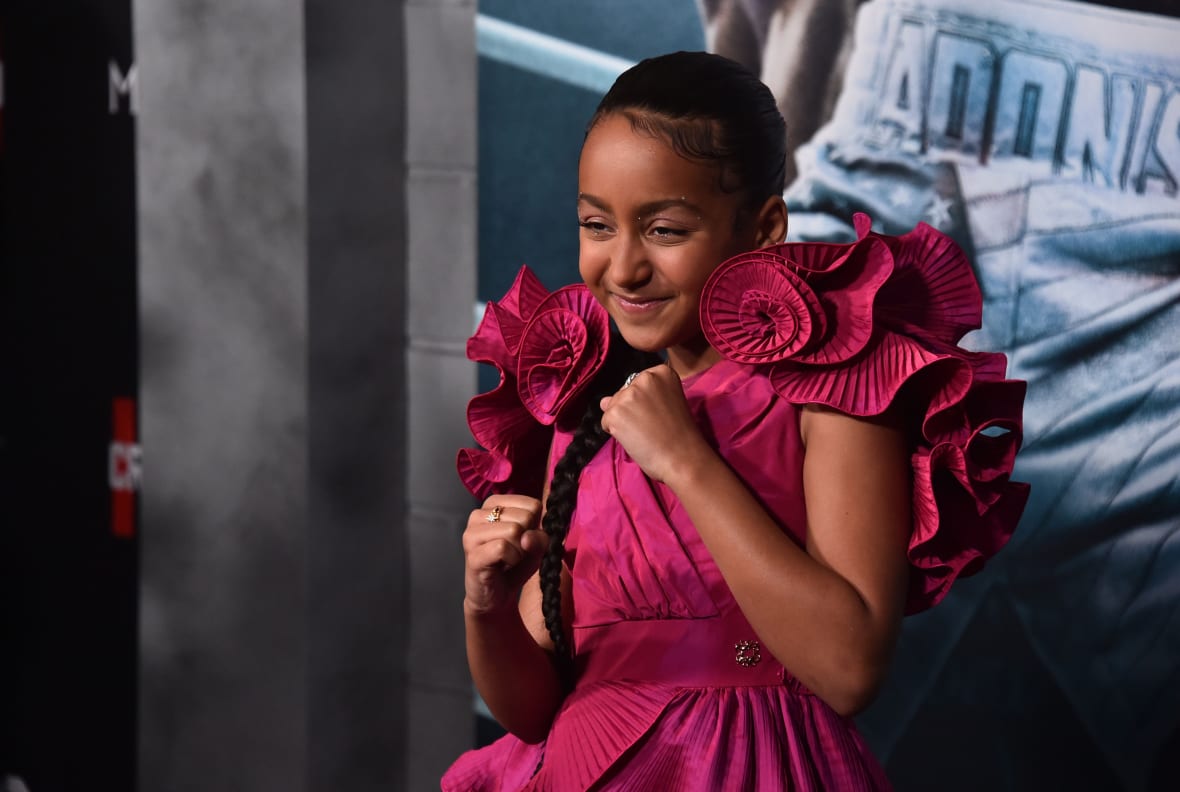
Adonis knows Dame has a right to be angry, and the only way Dame can release it is to meet Adonis in the ring. Each “Creed” training montage tops its predecessor, with Jordan’s effort raising the bar as Adonis pulls a plane that’s harnessed to his back in preparation to face the fullness of Dame’s rage.
In a stunning and artful black-and-white sequence, Jordan focuses his lens on Dame. It’s the eleventh round of the fight between Adonis and Dame, and Dame is fighting for his life. In his chair, just before the round begins, he’s his teenage self again – a scared, hurt little boy. When the bell rings, the stadium disappears, and he and Adonis are full grown, alone, going blow for blow. When Dame knocks Adonis back into the ropes, they turn into the cold, hard bars of a prison cell. Every punch is a plea. Why did you leave me? Why did you forget about me?
Only when they’re locked in hugs in each other’s arms can they stop hurting each other. But each time, the ref has to separate them and the fight continues. At the end of the fight, there is a champion, but there is no real victory. No one wins when the family feuds.
It’s only when Adonis can soften enough to forgive himself and asks Dame for forgiveness that Dame can accept it, with a new understanding that softness could be his, too. The tears they shed in the locker room together bring a whole new context to “locker room talk,” allowing both men to access and express the gulf of sadness and loss in their souls, unmasked.
With his eye toward healing, Jordan’s directorial debut is a fantastic technical and emotional achievement in the “Creed” canon and a triumph of the restorative power of Black male softness. It’s a sermon – without preaching – to the audience that craves its message.
Brooke Obie is an award-winning film journalist and author of the Black revolution novel “Book of Addis: Cradled Embers.’
TheGrio is FREE on your TV via Apple TV, Amazon Fire, Roku, and Android TV. Please download theGrio mobile apps today!
